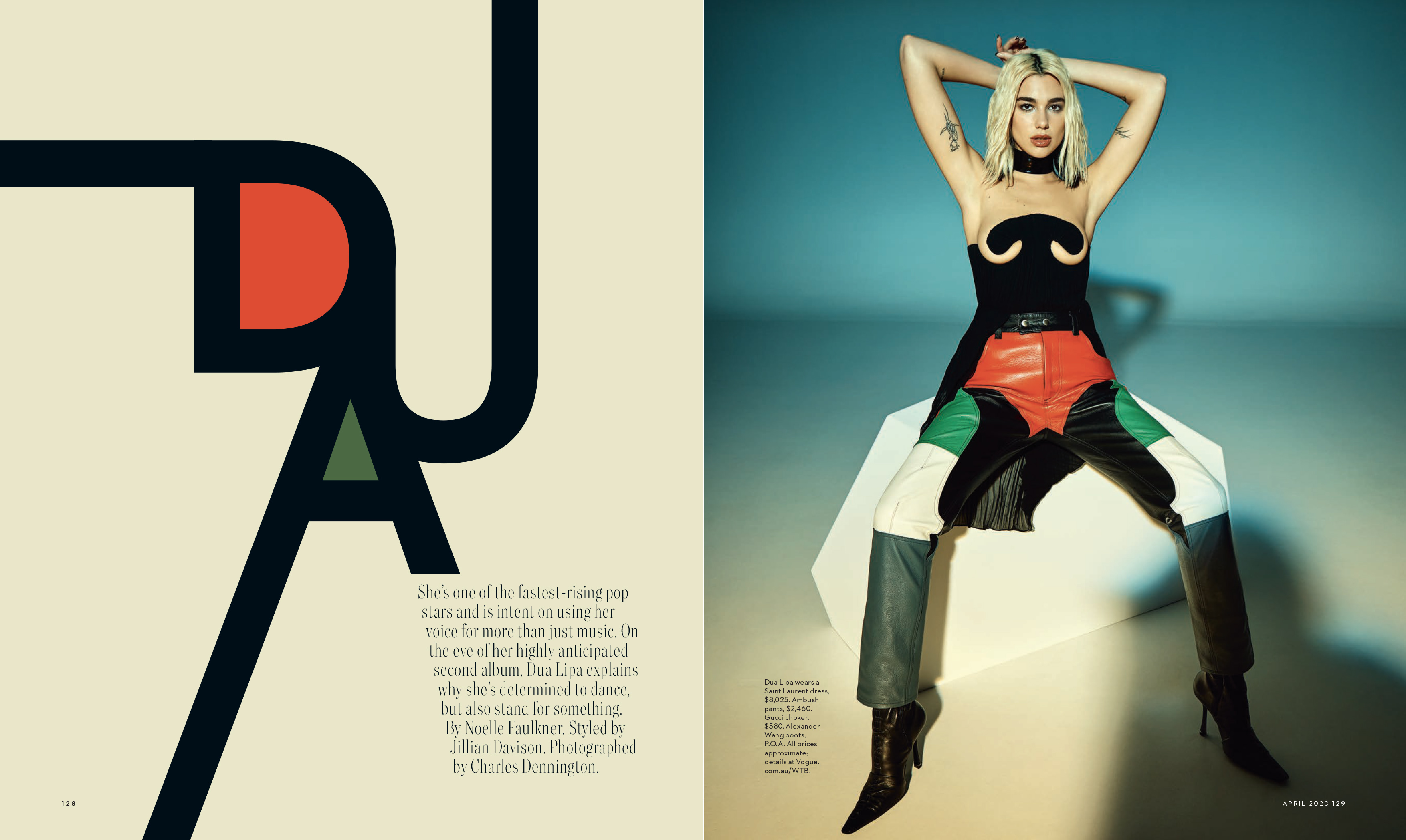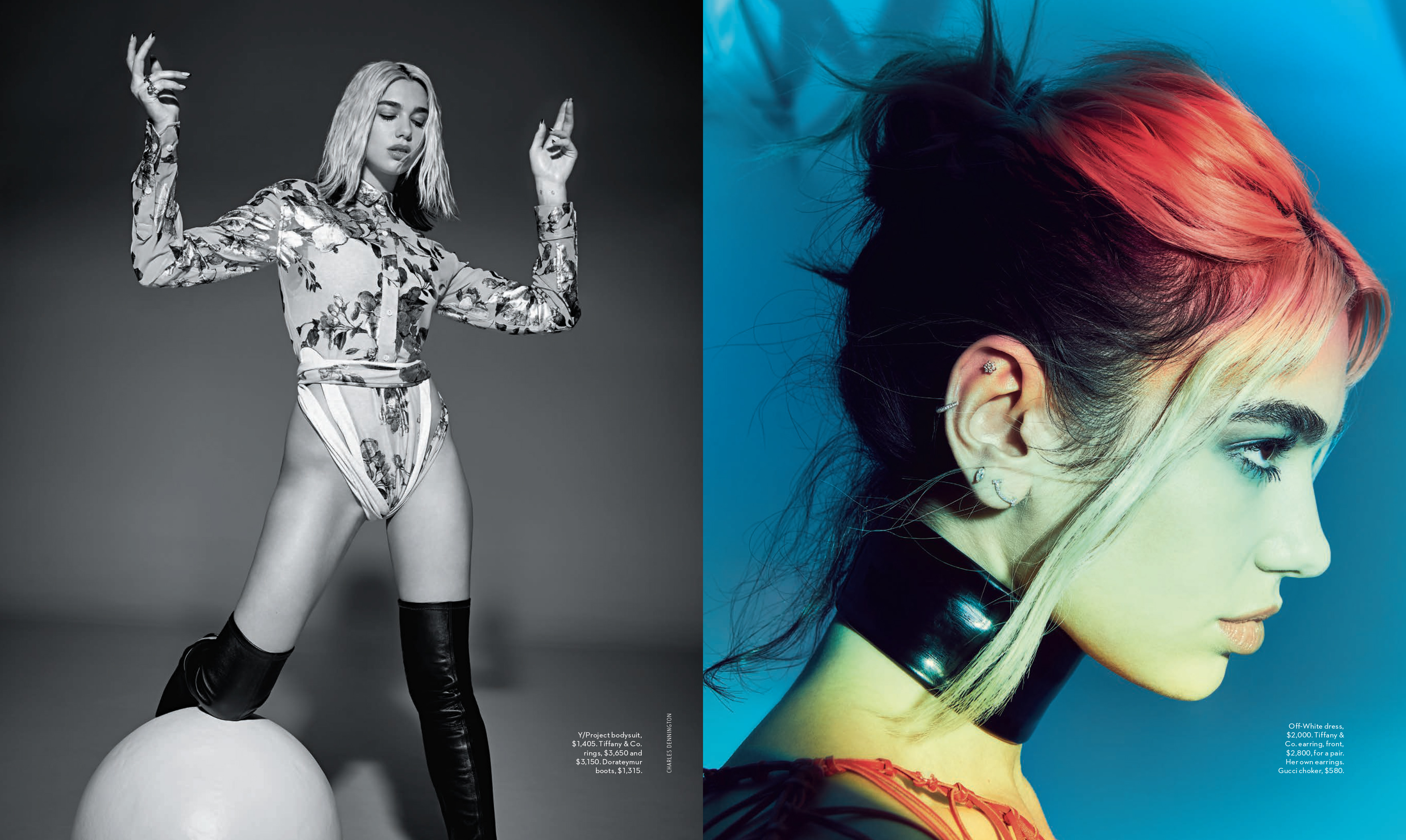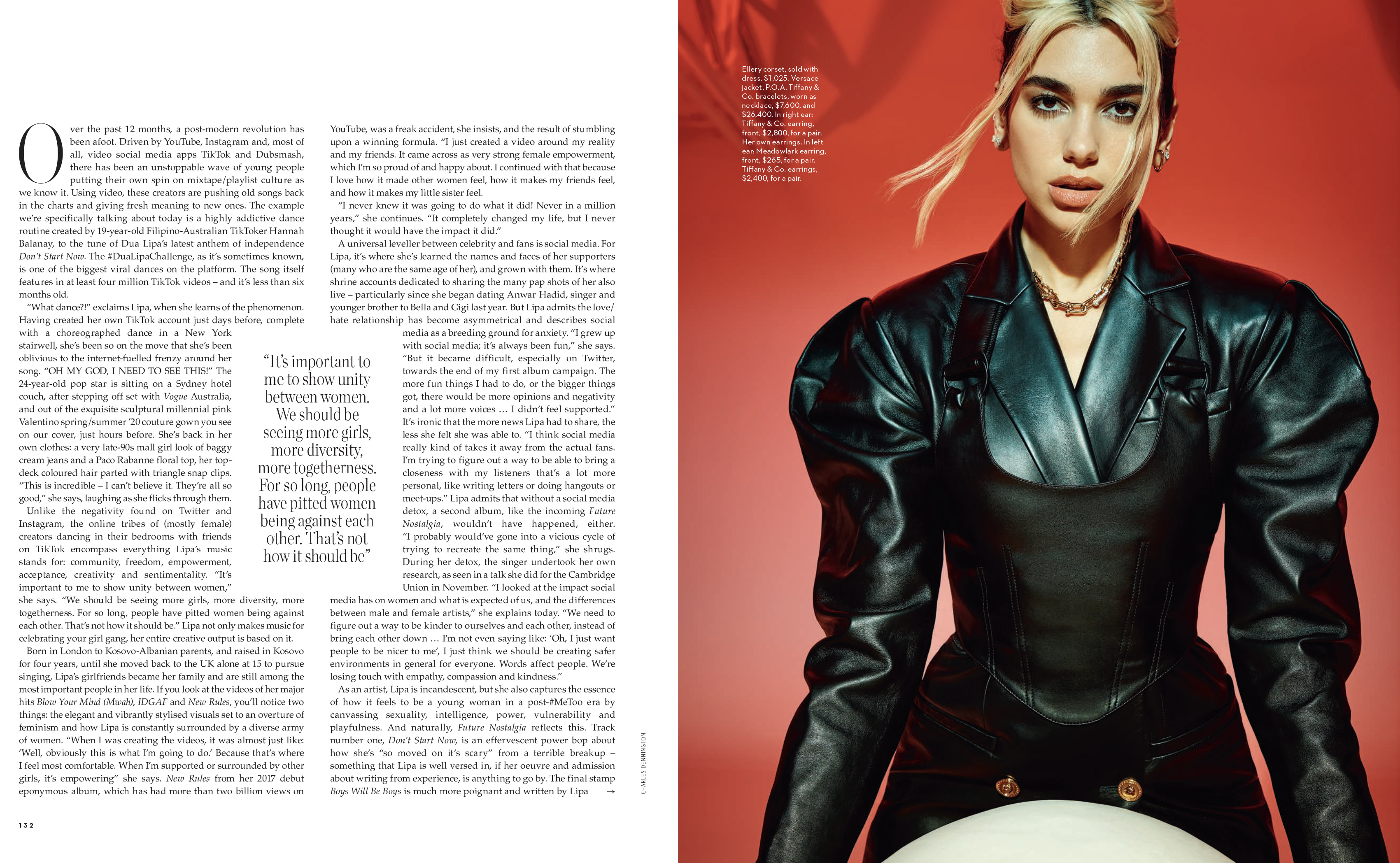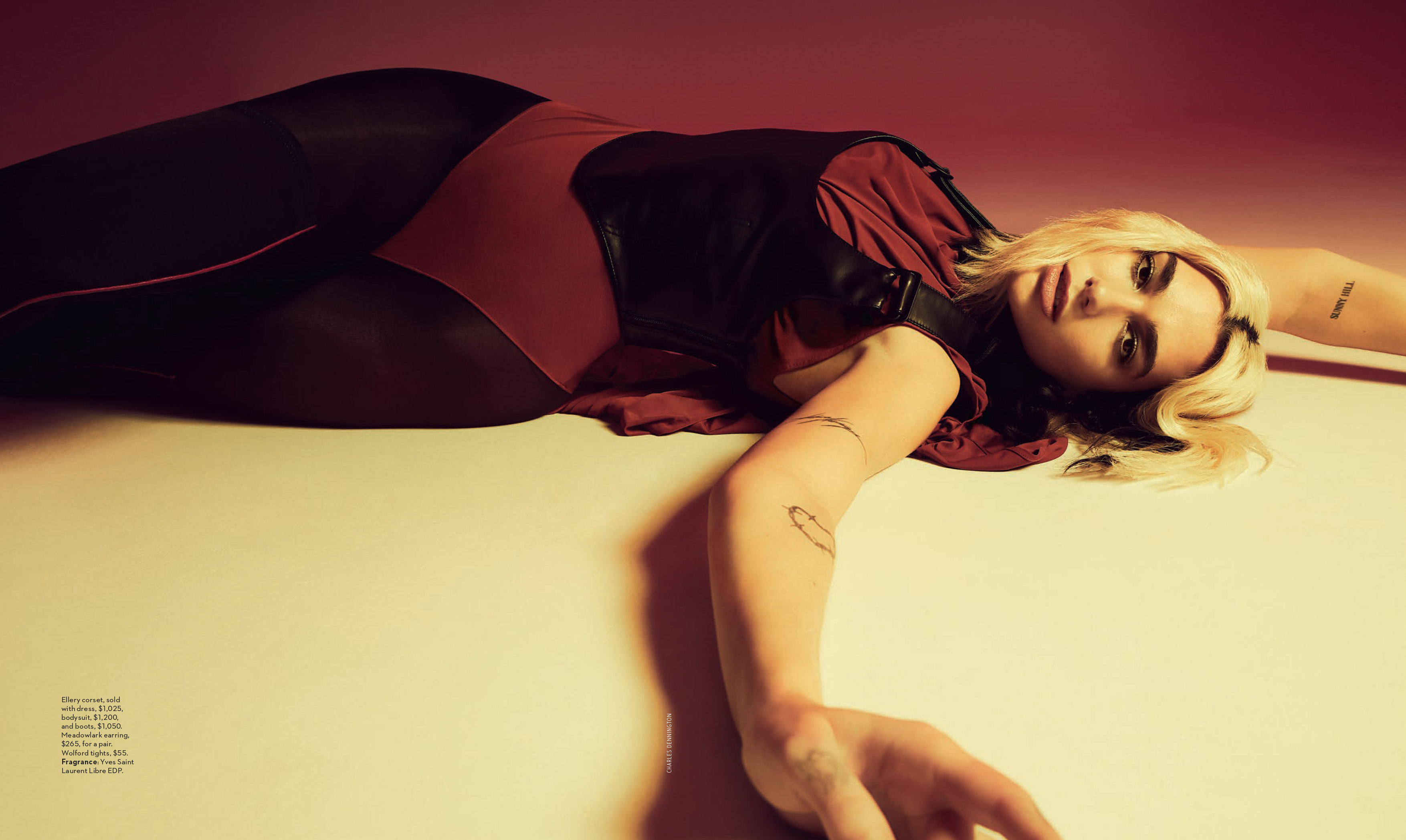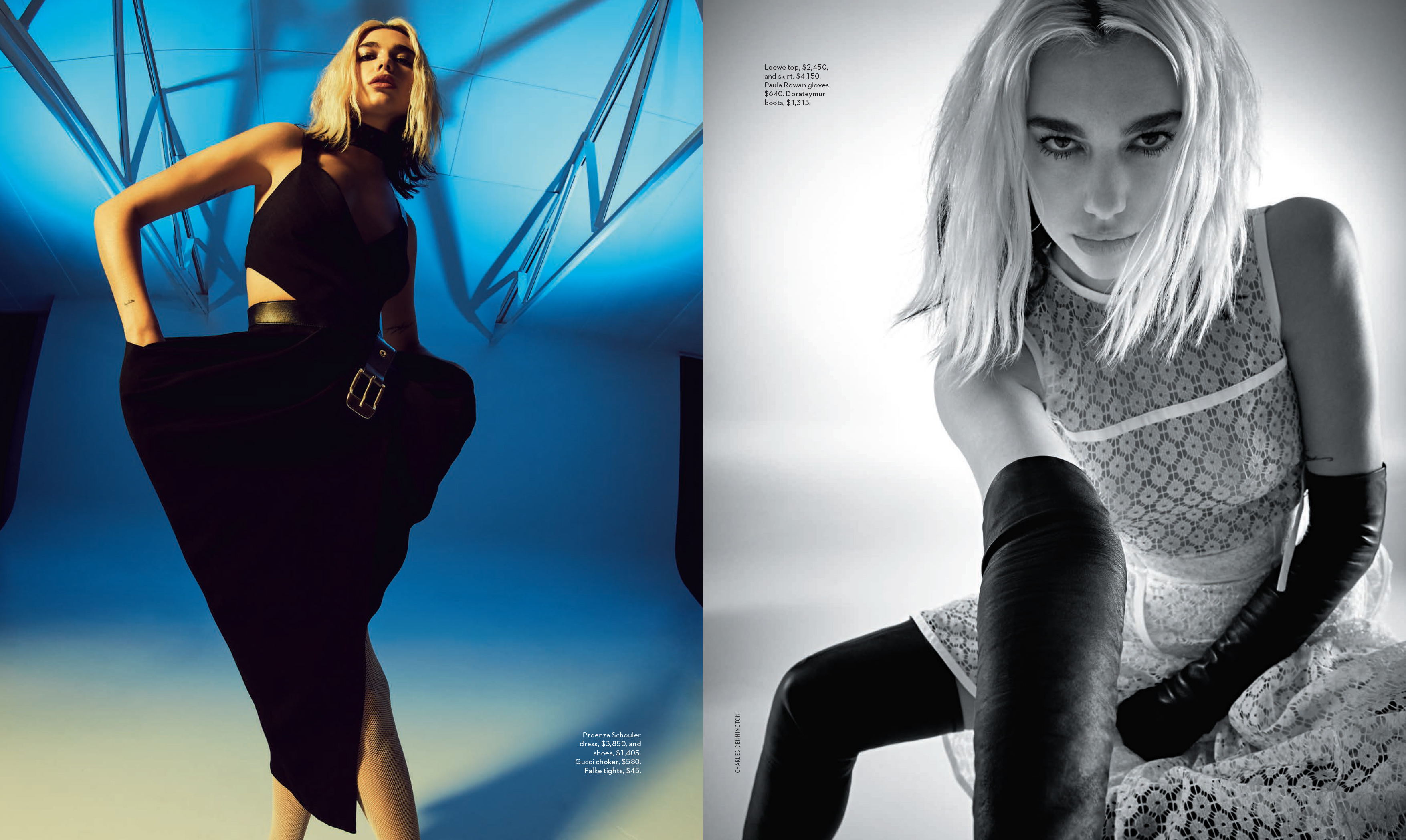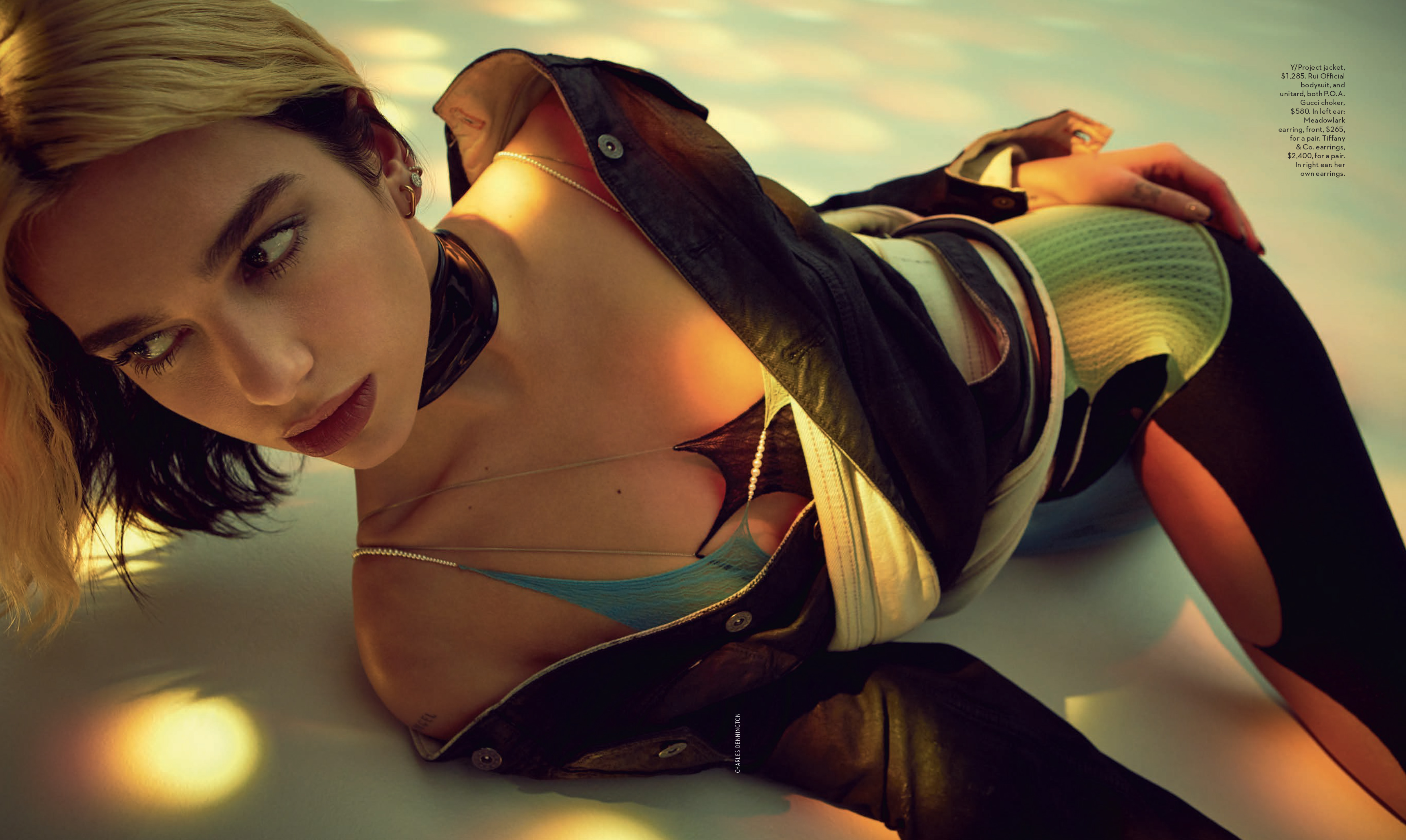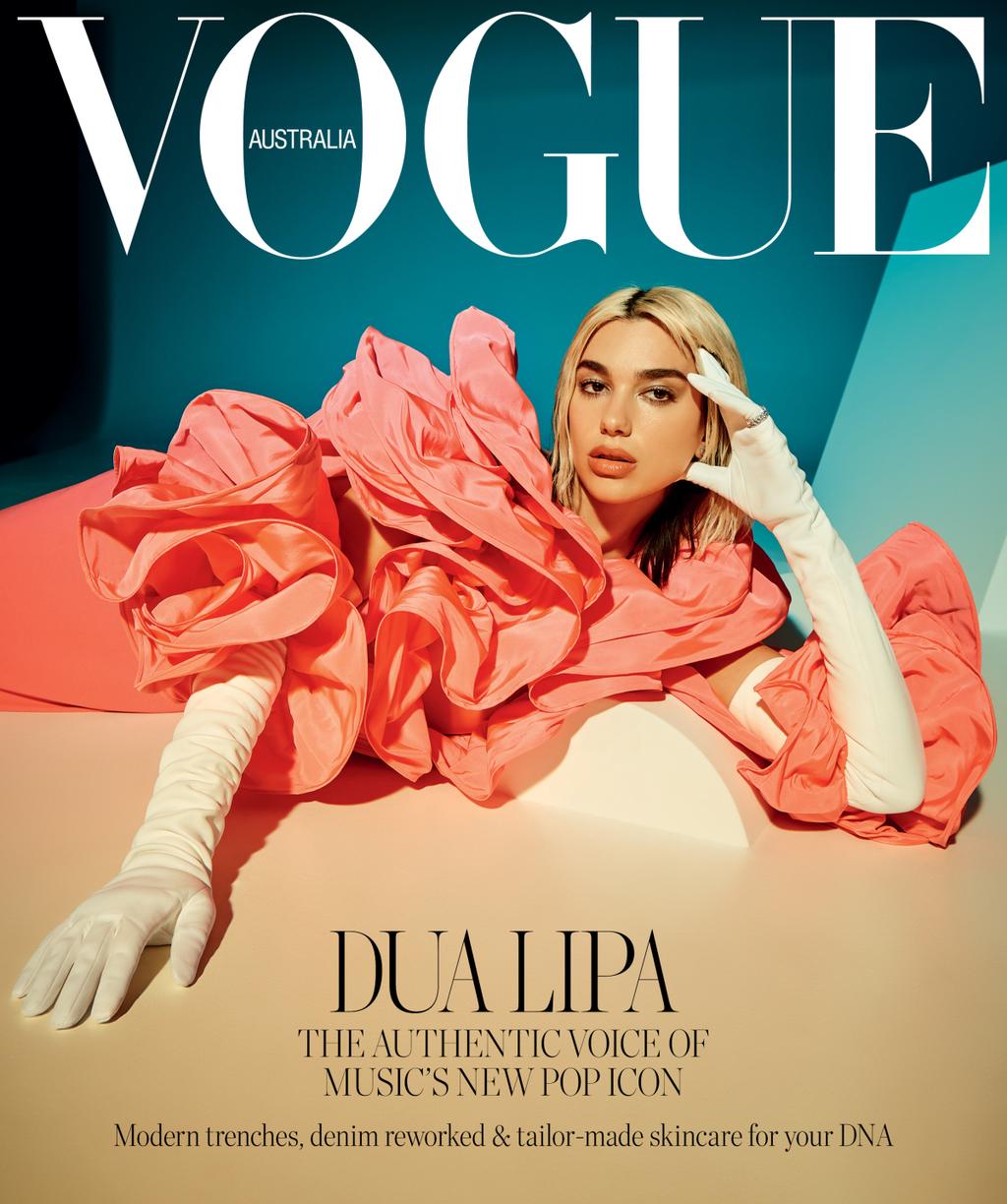
Vogue Australia, April 2020, (PDF) (LINK)
Over the past 12 months, a post-modern revolution has been afoot. Driven by YouTube, Instagram and, most of all, video social media apps TikTok and Dubsmash, there has been an unstoppable wave of young people putting their own spin on mixtape/playlist culture as we know it. Using video, these creators are pushing old songs back in the charts and giving fresh meaning to new ones. The example we’re specifically talking about today is a highly addictive dance routine created by 19-year-old Filipino-Australian TikToker Hannah Balanay, to the tune of Dua Lipa’s latest anthem of independence Don’t Start Now. The #DuaLipaChallenge, as it’s sometimes known, is one of the biggest viral dances on the platform. The song itself features in at least four million TikTok videos – and it’s less than six months old.
“What dance?!” exclaims Lipa, when she learns of the phenomenon. Having created her own TikTok account just days before, complete with a choreographed dance in a New York stairwell, she’s been so on the move that she’s been oblivious to the internet-fuelled frenzy around her song. “OH MY GOD, I NEED TO SEE THIS!” The 24-year-old pop star is sitting on a Sydney hotel couch, after stepping off set with Vogue Australia, and out of the exquisite sculptural millennial pink Valentino spring/summer ’20 couture gown you see on our cover, just hours before. She’s back in her own clothes: a very late-90s mall girl look of baggy cream jeans and a Paco Rabanne floral top, her top-deck coloured hair parted with triangle snap clips.
“This is incredible – I can’t believe it. They’re all so good,” she says, laughing as she flicks through them. Unlike the negativity found on Twitter and Instagram, the online tribes of (mostly female) creators dancing in their bedrooms with friends on TikTok encompass everything Lipa’s music stands for: community, freedom, empowerment, acceptance, creativity and sentimentality. “It’s important to me to show unity between women,” she says. “We should be seeing more girls, more diversity, more togetherness. For so long, people have pitted women being against each other. That’s not how it should be.” Lipa not only makes music for celebrating your girl gang, her entire creative output is based on it.
Born in London to Kosovo-Albanian parents, and raised in Kosovo for four years, until she moved back to the UK alone at 15 to pursue singing, Lipa’s girlfriends became her family and are still among the most important people in her life. If you look at the videos of her major hits Blow Your Mind (Mwah), IDGAF and New Rules, you’ll notice two things: the elegant and vibrantly stylised visuals set to an overture of feminism and how Lipa is constantly surrounded by a diverse army of women. “When I was creating the videos, it was almost just like: ‘Well, obviously this is what I’m going to do.’ Because that’s where I feel most comfortable. When I’m supported or surrounded by other girls, it’s empowering” she says. New Rules from her 2017 debut eponymous album, which has had more than two billion views on YouTube, was a freak accident, she insists, and the result of stumbling upon a winning formula. “I just created a video around my reality and my friends. It came across as very strong female empowerment, which I’m so proud of and happy about. I continued with that because I love how it made other women feel, how it makes my friends feel, and how it makes my little sister feel.”
“I never knew it was going to do what it did! Never in a million years,” she continues. “It completely changed my life, but I never thought it would have the impact it did.”
A universal leveller between celebrity and fans is social media. For Lipa, it’s where she’s learned the names and faces of her supporters (many who are the same age of her), and grown with them. It’s where shrine accounts dedicated to sharing the many pap shots of her also live – particularly since she began dating Anwar Hadid, singer and younger brother to Bella and Gigi last year. But Lipa admits the love/hate relationship has become asymmetrical and describes social media as a breeding ground for anxiety. “I grew up with social media; it’s always been fun,” she says. “But it became difficult, especially on Twitter, towards the end of my first album campaign. The more fun things I had to do, or the bigger things got, there would be more opinions and negativity and a lot more voices ... I didn’t feel supported.”
It’s ironic that the more news Lipa had to share, the less she felt she was able to. “I think social media really kind of takes it away from the actual fans. I’m trying to figure out a way to be able to bring a closeness with my listeners that’s a lot more personal, like writing letters or doing hangouts or meet-ups.” Lipa admits that without a social media detox, a second album, like the incoming Future Nostalgia, wouldn’t have happened, either. “I probably would’ve gone into a vicious cycle of trying to recreate the same thing,” she shrugs.
During her detox, the singer undertook her own research, as seen in a talk she did for the Cambridge Union in November. “I looked at the impact social media has on women and what is expected of us, and the differences between male and female artists,” she explains today. “We need to figure out a way to be kinder to ourselves and each other, instead of [bringing] each other down ... I’m not even saying like: ‘Oh, I just want people to be nicer to me’, I just think we should be creating safer environments in general for everyone. Words affect people. We’re losing touch with empathy, compassion and kindness.”
As an artist, Lipa is incandescent, but she also captures the essence of how it feels to be a young woman in a post-#MeToo era by canvassing sexuality, intelligence, power, vulnerability and playfulness. And naturally, Future Nostalgia reflects this. Track number one, Don’t Start Now, is an effervescent power bop about how she’s “so moved on it’s scary” from a terrible breakup – something that Lipa is well versed in, if her oeuvre and admission about writing from experience, is anything to go by. The final stamp Boys Will Be Boys is much more poignant and written by Lipa as a conversation starter. “It’s about the growing pains of what it’s like to be a girl,” she says. “For me, that was walking home from school and putting keys through my knuckles ... So much of the human experience for women revolves around men; how they make us feel, whether that is good or bad.” She adds: “Girls have to go through so much. You cover up yourself to avoid confrontation from men, avoid sexual harassment, people throwing words or catcalling. We change our ways to fit somebody else’s lifestyle. It’s really sad.”
Though not always comfortable with her role model status, Lipa wants the song to be taken as a guiding light for her young fans. “I want [them] to be able to listen to it and pose questions, and ask their siblings or ask their parents, or try and figure out a way to change that feeling so we don’t have to go through the same thing for so many generations.”
It’s a well-worn cliché in music journalism to talk of a new album being “the artist at their most honest”, but compared to her hit debut, Future Nostalgia is indeed more considered, artistic, authentic and clever. It feels familiar, yet not. Furthermore, it slaps – this album is a nonstop disco, with Lipa flexing her musicology muscle, revealing her as a postmodern pop artist intrinsically wrapped in the now. “When I was putting it together everyone was like: ‘Oooh, second album,’” she says. “I had to shut off the craziness ... I went into the studio with my friends and decided that all I wanted to do was make music that made me happy and made me dance. I just want to have fun.”
Lipa describes the danceability of the record as “relentless” and draws upon musical touchstones of her childhood, with nods to the 80s, 90s and early 00s music played in the Lipa family home. Parallel to what’s largely seen in culture right now, the Brit is also elegantly performing an homage to her idols, many of which share her appetite for experimentation with fashion. There are hints of Kylie Minogue (particularly Fever era), Moloko and Róisín Murphy, Blondie, Gwen Stefani, Eurythmics, Jamiroquai, OutKast, Pink and Prince; and reworked samples of INXS’s Need You Tonight and White Town’s Your Woman. It’s a noble tribute without feeling on the nose, partly because Lipa’s incredible vocals are always confidently front and centre. “At the end of the day, we’re all just on the backs of giants,” she says. “Everything keeps coming back, from fashion to music. I think it’s important to try and recognise that but create a new way of doing things.”
Lipa is a cultural bowerbird of sorts and a contemporary art lover, which spills into her playful nature with fashion – particularly when it comes to experimenting with texture, colour and mood. In fact, having her list her favourite artists probably reveals more about her as a creative than anything else. Among Lipa’s delicate tattoos, two stand out – the Keith Haring running men on each thumb. “I love everything he stood for and the freedom of what street art stands for,” she explains. “I’ve always felt inspired by art. My parents would take me to the Tate Modern, to galleries ... I learn through art.” Lipa name-checks Jean-Michel Basquiat, Jeff Koons, Yayoi Kusama, FriendsWithYou, Ben Is Right (Ben Evans), Harland Miller, the Connor Brothers, Magda Archer and CB Hoyo as her favourites – artists who are famously mischievous, colourful and pop, but often ironic in their sensibilities. “I try to include art in my live shows as much as I can, too,” she reveals. “Like what James Turrell does with lighting – I love that! My last tour, I had lots of Rothko-inspired visuals.”
While the accolades are certain to continue pouring in, Lipa is ambitious, focussed and has aspirations beyond the associated superlatives of fame (though an Album of the Year Grammy nomination is up there). “I want to do this for as long as I can and still feel hungry,” she says. “But I would love to sign artists at some point, support young girls in the industry. That’s a really big dream of mine.”
In 2016, Lipa set up the Sunny Hill Foundation in Prishtina-Kosovo with her father, a charity to support an oft-forgotten generation of young people in her homeland. “We’re opening an arts and innovation centre this year. We’ve got three young artists in Kosovo scholarships to attend art school in Los Angeles,” she says. “Music’s my first love but I want to keep pushing with this kind of stuff, and give kids a leg-up.”
As one of the few British female artists in the top echelon of the charts at the moment, Lipa is a self-appointed spokesperson for young women in the UK and takes advantage of every public speaking event to champion equality in creative industries. At the very base level of what she does, Lipa, with her creative autonomy and empathetic, genuine and zero-fucks-given attitude, is transforming the role of a modern-day pop star, and making it look effortless. “I think it’s important to do things that you believe in,” she says. “Being a part of this feminist wave in music without even initially thinking about it is something I’m so proud of, because of the impact it has.”
When quizzed on how she sees pop culture’s role changing with the current state of the world, particularly among young people, Lipa offers: “For me, everything that’s happening in the world at the moment can be hard to digest at times ... I guess, with this album, I wanted to try and get away from the current political climate. I wanted to make music that takes your mind away from that.” She makes the point, after all, music harnesses the power of escapism. “Talking about injustice and politics, it angers and upsets me. I wanted to just make it a bit easier for me to get out of bed and not think about the negative things that are going on in the world all the time.”
“The most important thing is to be authentic. That’s what makes it relatable. You never know what the next thing is that could unite people,” she says with a shrug. “What is amazing is that more artists are speaking up about important things. That is the most you can really hope for from pop culture.”
Future Nostalgia is out April 3.
